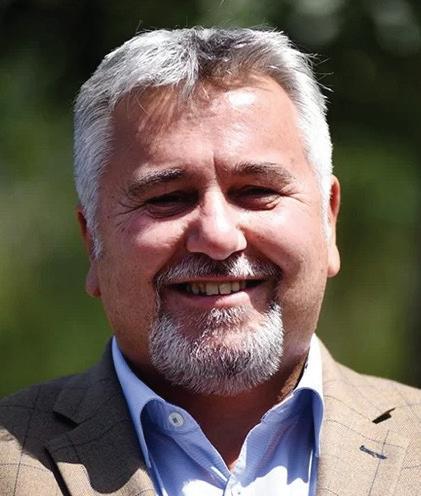
3 minute read
SPOTLIGHT TECH Biodiesel Filtration: Protecting Centrifugal Separators with Eaton’s Advanced Technology
MCS-500 Self-Cleaning Filter Solution Boosts Plant Efficiency and Reliability
Utilizing waste cooking oil as a key raw material, a top biodiesel producer faced the challenge of maintaining efficiency while preventing clogging in their centrifugal separators. To accomplish this, they adopted Eaton’s MCS-500 advanced automatic self-cleaning filtration system. This not only helped streamline their production process, but also significantly enhanced overall plant efficiency and reliability.
With multiple facilities and an impressive annual production capacity of 250,000 tons, the company has rapidly ascended as one of the country’s leading biodiesel producers.
Biodiesel can be produced from various feedstocks, including vegetable oils, animal fats, or recycled oils such as used cooking oils (UCO). The whole biodiesel manufacturing process encompasses five key stages: feedstock purification, transesterification reaction, separation, distillation, and quality testing.
The feedstock purification stage is particularly challenging when using UCO, which often contains a complex and unpredictable contaminant mixture including food particles and burnt residues. These impurities are removed using a centrifugal separator that is notably challenging to maintain.
The separator must operate at high efficiency to remove impurities without becoming clogged or damaged by large particles. Any compromise in its operation can lead to frequent maintenance, severely affecting overall process efficiency.
The pretreatment step, therefore, becomes indispensable in safeguarding the centrifugal separator. It typically involves using strainers or filters to remove larger particles before the oil enters the separator. However, the challenge lies in selecting and maintaining the appropriate filtration system that can handle the highly variable contaminant load.
Inadequate filtration can lead to the bypass of larger particles, which can damage the separator’s delicate internal components. On the other hand, overly frequent filter changes and maintenance can increase operational costs.
The company searched for both domestic and international manufacturers of automatic filters, prioritizing those with a proven track record of addressing similar process challenges and the capability to fulfill demonstration trial requests. The biodiesel producer selected Eaton’s Filtration Division to engineer a solution.
Automatic Self-Cleaning Filter System
Eaton proposed a state-of-the-art automatic filtration system chosen for its strong performance in managing high levels of suspended solids (SS) as well as its capacity to function in harsh conditions.
This solution involved the deployment of two key products:
• MCS-500: This automatic self-cleaning filter unit is designed to handle up to 500 PPM of inlet SS, making it ideal for the high-contaminant load found in UCO.
• DCF-800: Used for field testing, this mechanically cleaned filter allowed for realtime adjustment and optimization during the initial trial phase.
“The implementation started with an extensive three-month field test, during which DCF-800 filters were strategically installed at key points along the biodiesel production line, especially before the centrifugal separators,” said Ulrich Latz, Global Industrial Filtration Product Manager at Eaton. “This setup enabled the company to directly observe filtration efficiency throughout the trial. Following this, our engineers refined the operating conditions using the insights gained, supplying our customer with optimized calculations for the disc stroke and purge cycles.”
MCS-500 mechanically-cleaned strainers are designed with durable stainless-steel screens from 15 microns to ¼-inch perforations to handle a wide range of particle sizes and types. Eaton. All rights reserved.
Latz also explained how the availability of various filter elements for testing facilitated solution finding. The company’s previous filter element had a 25-μm efficiency; however, testing of various Eaton filter elements determined that a 75-μm slotted wedge wire filter would meet the process requirements most effectively.
This was critical in demonstrating filtration capabilities, thus ensuring the solution was tailored to meet the company’s precise needs.
Enhanced Process Reliability
Ultimately, the company installed MCS-500 units at the front end of the centrifugal separator. By fine-tuning the purge cycle and disc stroke cycle, this solution can adapt flexibly to varying particle levels, ensuring optimal filtration. Additionally, as oil passes through the filter, it forms an oil film, which can cause fluctuations in flow similar to a coating effect. The MCS-500 effectively addresses this by removing the oil film during the disc work process.
Another significant enhancement is the ability for operators to set up and initiate the filter purging cycle without interrupting manufacturing, contributing to a smoother, continuous workflow.
“While exact savings are confidential, our customer has confirmed that the ROI period is under one year,” said Latz. “Additionally, although maintenance guidelines suggest changing the filter elements annually, the company has not needed to replace them since their initial installation. This highlights the effectiveness of the MCS-500 solution in this application.”
Encouraged by the project’s success, the company is now investigating filtration challenges in other intensive applications like marine and aviation fuel production, anticipating continued purchases of Eaton products to support their expansion and progress. www.eaton.com
For details on how to submit your company’s technology for consideration as a “Technology Spotlight” in IFN , contact Ken Norberg at ken@filtnews.com or +1 202.681.2022.








